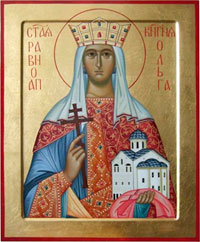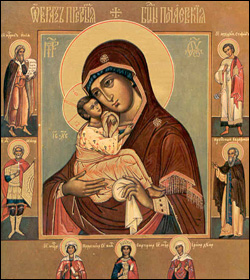|
On July 24th (the 11th by the old calendar) the Church commemorates the holy equal-to-the-apostles Princess Olga of Russia.
Church history shows us how wonderful and significant was the participation of some holy women, the elect of God, in the spreading of Christianity among pagans. It suffices to mention St. Mary Magdalene, equal-to-the-apostles, and the holy myrrh-bearing women, who were chosen by God to be the first messengers of Christ’s glorious Resurrection; the holy equal-to-the-apostles Queen Elena in the former Greek kingdom; Saint Nina in Georgia; Saint Ludmila among the western Slavs. The Russian land also has its equal-to-the apostles saint – blessed Olga, grandmother of the enlightener of Russia – holy Prince Vladimir. Saint Olga was born in the region which later became known as the city of Pskov. Without yet knowing the true God, Olga was distinguished by bright and profound intelligence and by strict chastity (a virtue totally unknown among the pagans). The Prince of Russia Igor, who greatly loved hunting, met her by chance in the Pskovian forests and was so amazed by her wise discourse, as well as by her beauty, that he took her for his wife. After Igor’s death Olga governed the Russian land by herself. She strictly punished the Drevlyanians, a tribe which had perfidiously killed her husband, was fearsome to the enemies of her homeland, while her people loved and respected her as a mother for her wisdom and justice. She never offended anyone, judged fairly, tempered punishment with mercy, loved the poor, the aged and the handicapped; she carefully heard out everyone who came to her with a plea and willingly fulfilled all fair requests. When her son Svyatoslav, who was a 4-year-old child when his father died, grew up, she handed the reins of government over to him, in order to have more time for charitable works.
Such a virtuous life attracted God’s grace to her: with each day it became clearer and clearer to her that only senseless people can look upon soulless idols as gods. During Olga’s rule there were already some Christians in Kiev, but only a small number of them. She apparently knew them; talks with them completely revealed to her the holiness of Christ’s teaching, and in her heart she became a Christian, but she felt that it was unsafe for her to become baptized in Kiev which was filled with pagans. Thus, hearing that the faith of Christ had come to Russia from the Greeks, the wise Olga wished to visit that country herself. Taking with her a small company of noblemen and relatives, she arrived in Constantinople and presented herself to Patriarch Polyeuctus. The Patriarch took a genuine fatherly interest in the Russian princess. Olga remained in Constantinople for three months, studying the Christian faith under the guidance of the Patriarch himself. She attended church daily; the beauty of the churches, the harmonious singing, the ceremony of the services – all of this made a great impression on her soul and her heart. Finally the Lord fulfilled her ardent wish: Olga was enlightened with holy baptism and given the name of Elena in honor of the equal-to-the-apostles queen. Her godfather was the Greek Emperor Constantine himself. During the divine Liturgy the Patriarch turned to her with the following words: “Blessed art thou among Russian women for having embraced the true light and having rejected darkness! Thou hast thus avoided eternal death and hast found eternal life. From this time onward thou shalt be magnified by all the sons of the Russian land!” These words were prophetic. Many of those who came together with Olga were also baptized, and there was great joy not only in the Russian family, but in all of Constantinople. As Olga prepared to return to her homeland, the Patriarch blessed her with a holy cross containing particles of the Live-giving Cross of the Lord. The Patriarch also instructed several clergymen to travel to Russia together with Olga, in order to perform church services there.
After arriving in Kiev, Princess Olga earnestly began propagating the faith of Christ in her native land. She converted many Kievans to Christianity and built for them a church in honor of St. Nicholas on the burial place of Askold, one of the founders of Kiev. The church of St. Sophia, initially a wooden one, was also built by her. Afterwards St. Olga visited Great Novgorod and other regions of her country. With sermons, and instructions, and the grace of God she converted many compatriots to Christianity, and trampling upon the idols, in their place she set up holy crosses, which produced many great miracles and signs, shaming unbelievers.
One thing did not cease to be a cause of great sorrow for blessed Olga – her son Svyatoslav did not even wish to hear anything about Christianity. “I have come to know the true God, my son, – the holy mother told him, – I have come to know Him and to rejoice. If you come to know Him, you too will rejoice. The Christian faith brings light and joy to the soul; it so affects a man’s soul, that he himself feels its divine worth; accept this faith – and not only will you not be sorry, but you will believe yourself to be the happiest of men, just as I feel myself to be the happiest among all people.” But the proud son responded thus to his mother’s wise advice: “How can I accept a foreign law? My comrades-in-arms will laugh at me.” And not only did he not heed his mother, but he often offended her. He loved military glory and feats, and constantly left his land, traveling with his company beyond the Danube River or to other places. Seeing the prince’s disregard for the Christian faith, his soldiers and noblemen often humiliated the Christians and even put them to death unjustly. How difficult it was for blessed Olga to look upon this! But she endured everything, constantly praying and hoping for God’s mercy in the future. Saint Olga’s grandsons, the children of Svyatoslav – Yaropolk, Oleg and Vladimir, were almost constantly in her care due to their father’s absence, and she earnestly taught them the Christian faith, but refrained from baptizing them without their father’s approval. Therefore, she placed all her hope in the Lord, and awaited His benevolence towards her family and her people. And the Lord fulfilled the ardent prayers of the humble Russian princess: one of her grandsons, Vladimir, enlightened Russian with holy baptism.
Having lived until a ripe old age, Olga was stuck by a mortal illness. Svyatoslav was away as usual, but hurriedly came back to see his mother, whom he found on her deathbed. The dying mother tried one last time to talk her son into abandoning destructive idol-worshipping and converting to Christ, but even now the unfortunate son did not listen to her and was punished by a sudden and shameful death – just as his mother had foretold him.
Blessed Olga’s death was quiet and peaceful. After receiving holy communion, she peacefully reposed on July 11, 969. All the Kievans cried over her – both Christians and pagans. Her body was buried with honor in the city of Kiev. The venerable chronicler Nestor, completing his narrative about Olga, writes: “She preceded Christianity in our land as dawn comes before the sun, as the moon shines in the night – thus she shone among unbelievers. The sons of Russia glorify her as a chieftain leading them into the Heavenly Realm. Even after her death she prays to God for Russia!”

August 5th (July 23rd by the old calendar) marks the feast of the Pochayev icon of the Mother of God.
The history of this miraculous icon is inseparably tied with the Pochayev Monastery in honor of the Dormition of the Theotokos, which is located in the southwest of Russia. The monastery was founded back in the 13th century and flourished in the late 16th / early 17th centuries.
The miraculous image of the Holy Theotokos called the Pochayev icon was received as a gift from the Greek Metropolitan Neophyte, who stopped at the home of a certain Goyskaya, mistress of a large estate, on his way to Moscow in 1559. For 30 years the icon stood in the landowner’s chapel before it was noticed that an extraordinary light was issuing from the image. After Goyskaya’s brother, Philip Kozinskiy, who was born blind, was miraculously healed by the icon, the pious landowner gave the sacred relic to the monks of the Pochayev monastery. The icon was then carried over to Pochayev in a ceremonious procession.
The small icon depicts the Mother of God with the Pre-eternal Infant on Her right arm. In Her left hand She holds a towel with which the Infant Jesus was covered. The Lord has His left hand placed on His Mother’s shoulder, while His right hand is raised in blessing; the Mother of God’s face is inclined towards Her Son’s head. There are seven miniature images of saints depicted on the sides of the icon: the prophet Elias, martyr Menas, protomartyr Stephen, venerable Abrahamus, great-martyr Catherine, martyr Paraskeva, and martyr Irene. The “Book of Records of Pochayev Miracles” reports a multitude of healings after prayer to the Most-holy Theotokos, sent through Her Pochayev icon.
For four centuries the Heavenly Queen also granted Her all-powerful aid to the Pochayev monastery. Thus, in the summer of 1675 the Turkish troops of Khan Nurredin besieged the Pochayev Lavra on three sides. The weak monastery walls did not represent a serious barrier. The monks and the laymen who had sought sanctuary in the monastery fearfully awaited the beginning of the attack. The abbot of the monastery summoned all the Orthodox faithful to appeal for help to their heavenly intercessors – the Holy Virgin and St. Job of Pochayev. Throughout the entire night the besieged people earnestly prayed before the miraculous icon and the tomb with the relics of the saint. In the morning of July 23rd, when the sun came up, they started to sing an akathist to the Mother of God. At the words “Champion Leader” a wondrous miracle occurred. The Holy Theotokos Herself appeared over the monastery church, together with a multitude of angels holding unsheathed swords. St. Job stood next to the Mother of God and entreated Her to defend his monastery. Seeing the celestial troops, the Turks took them for a phantom and began shooting arrows at the Queen of Heaven and the angels. But the arrows came back to them and struck the infidels. Then the Turkish army became greatly agitated, the soldiers started killing each other, and afterwards began fleeing in panic. The defenders of the monastery were able to capture many of them. Some of the Turks were subsequently baptized and remained in the Pochayev Lavra for good. Later an annual celebration in honor of the Pochayev icon of the Theotokos was established to commemorate the miraculous deliverance on July 23rd by our Intercessor and Helper in all sorrows.
|